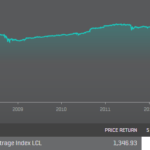The rout in municipal bonds couldn’t be more sudden. As rates headed higher, investors sold off municipal bonds, pushing the largest municipal bond fund, iShares National AMT-Free Muni Bond ETF (MUB), to its biggest discount in history.
The bond market is much less liquid than the stock market. Bond ETFs often drive the fixed-income market, since ETFs are much more liquid than individual debt securities. That’s why actively managed bond funds exceed the performance of indexed bond ETFs.
Now that municipal bonds are selling off, is it finally time to listen to Meredith Whitney’s advice to get out of the municipal bond market?
Run from munis?
Meredith Whitney will live in infamy after her call on municipal bonds. She took to 60 Minutes, claiming that billion-dollar defaults would be the new normal as American cities would soon file for bankruptcy. So far, her call couldn’t be more wrong. Housing prices are going up, property tax revenue is following, and we’ve yet to see municipal defaults worthy of mentioning. We called her out at ETFbase in 2012.
To be fair, Meredith Whitney was right – defaults have gone up, but not to the extent that she called for.
Moody’s Investors Service wrote in its recent report that defaults happened on an average of 1.3 per year from 1970 to 2007. Since the financial crisis, defaults have averaged 4.6 per year.
Fewer than 5 defaults per year is hardly a crisis, since the total average default rate comes in at single basis points – .03% per year. It’s not defaults that are leading the selling pressure in munis; it’s all about higher rates. Meredith Whitney was wrong; it’s the Fed, not bankruptcies, are pushing municipal bonds lower.

Munis for the long haul
Municipal bonds remain an excellent investment for high-income, high net worth individuals who need shelter from income taxation. The tax benefit is largely baked-in; the iShares National AMT-Free Muni Bond ETF (MUB) has a tax-equivalent yield of 4.76%. (Efficient markets negate the benefit of untaxed income.)
Those in the highest of tax brackets should enjoy the income potential in municipal bonds given that the iShares fund has an effective duration of 6.91 years, which insulates it from most convexity risk. The 30-year US Treasury yields only 3.56% vs. a tax-equivalent yield of 4.76% for 7-year munis. If you’re looking for tax-free income from short-term debt securities, municipal bonds are the place to be.
Investors should take note. Municipality defaults are high at .03% per year, but still much lower than corporate credit defaults, and certainly lower than junk-rated firms. An end to an $85 billion-dollar bond buying spree will have much less effect on municipal debt than it will on high-yield issues. Thus, default risk is muted.
Municipal bonds deserve more attention from investors. The iShares National AMT-Free Muni Bond ETF (MUB) has a tax-equivalent yield that ranks with junk bond funds, yet municipal bonds have significantly less credit risk. That makes it a great bet for investors who are interested in the next 10 years, not just the next 10 days.
Disclosure: No position in any tickers mentioned here.


![Jeep Heroes Program – And Veterans Special Offer [Sponsored Video]](https://www.etfbase.com/wp-content/plugins/wordpress-23-related-posts-plugin/static/thumbs/2.jpg)







{ 0 comments… add one now }